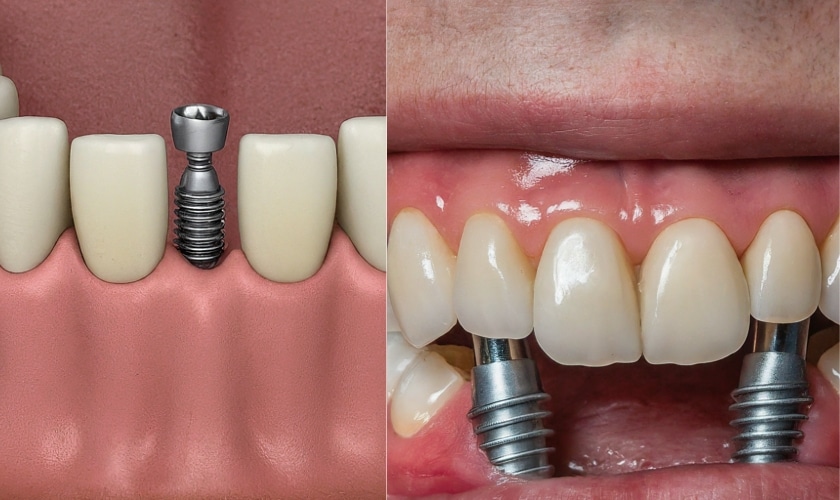Things about Dental Sense
Not known Details About Dental Sense
Table of ContentsWhat Does Dental Sense Mean?The Greatest Guide To Dental SenseThe Main Principles Of Dental Sense Little Known Facts About Dental Sense.
are clinical devices surgically implanted into the jaw to bring back an individual's ability to eat or their look. They supply assistance for synthetic (phony) teeth, such as crowns, bridges, or dentures. When a tooth is shed because of injury or disease, an individual can experience problems such as fast bone loss, defective speech, or changes to chewing patterns that lead to pain.Oral implant systems contain a dental implant body and dental implant abutment and might also consist of a joint addiction screw. Wisdom tooth cavity. The oral implant body is operatively put in the jawbone instead of the tooth's origin. The oral implant abutment is generally connected to the dental implant body by the joint fixation screw and expands with gums into the mouth to sustain the attached fabricated teeth
(https://hubpages.com/@dentalsense1)Structure of The Oral Implant System selecting dental implants, talk to your dental service provider regarding the potential advantages and risks, and whether you are a candidate for the treatment. Points to consider: Your overall wellness is an important element in figuring out whether you are a great candidate for dental implants, just how long it will certainly take to heal, and just how long the dental implant might remain in area.
Cigarette smoking might influence the healing process and lower the lasting success of the implant. The recovery process for the implant body might take numerous months or longer, during which time you normally have a momentary joint in place of the tooth. the dental implant treatment: Meticulously comply with the dental health instructions provided to you by your oral provider.
The Ultimate Guide To Dental Sense
Implant failing can lead to the requirement for an additional operation to take care of or replace the dental implant system. Brings back the capacity to eat Recovers aesthetic look Assists keep the jawbone from reducing as a result of bone loss Protects the health of the bordering bone and gum tissues Assists keep adjacent (neighboring) teeth steady Improves top quality of life Damages to bordering all-natural teeth throughout dental implant positioning Injury to the surrounding cells during surgery, such as sinus opening Injury throughout surgical treatment (for instance, fracture of bordering jawbone) Insufficient function, such as seeming like the teeth do not bite with each other usually An experience that the tooth hangs or twisting in position arising from a joint screw loosening Implant body failure (looseness of the implant body) as a result of systemic infection, which may be more likely in individuals with unchecked diabetics issues due to neighborhood infection in bone and gum tissues sustaining the implant body as a result of delayed recovery, which may be most likely in people who smoke Trouble cleaning the gum tissues around the implant, resulting in inadequate oral hygiene home Without treatment gum illness Post-surgical feeling numb due to nerve impingement or damage Constantly alert healthcare suppliers and imaging technicians that you have oral implants before any kind of magnetic vibration imaging (MRI) or x-ray procedures.
FDA is not knowledgeable about any type of unfavorable events reported for MRI or x-ray treatments with oral implants. Oral implants systems are typically made of products that adhere to global consensus standards of the International Organization for Standardization (ISO) or ASTM International. These standards have details of what makes a safe material.

An oral implant is a framework that replaces a missing out on tooth. With screw-like devices, the specialist inserts an implant right into the jawbone, and it acts as an anchor for a synthetic tooth, called a crown.
The smart Trick of Dental Sense That Nobody is Talking About
Some people are not qualified for dental implant surgical procedure. It is for oral surgeons to operate on people with: intense illnessuncontrollable metabolic diseasebone or soft cells illness or infectionIf these concerns are solved, an individual can have the surgical procedure. In, dental cosmetic surgeons avoid operating on people with: If people with any of the above go through dental implant surgery, there is a greater threat of the dental implant falling short.

Oral implant surgical treatment is a customized procedure. It's not the same for every person. The following offers a general review of what you can anticipate your dental practitioner, oral doctor, periodontist or prosthodontist to do: Position the dental implant operatively. Provide you time to recover. Attach the message and final crown, bridge or denture.
Next off, your specialist will meticulously position the oral implant right into your jaw. If your implant is near the front of your mouth, your dental professional will make a temporary tooth for you to wear until you recover.
More About Dental Sense
Your service provider can tell you what to anticipate in your situation. Throughout the recovery stage, your jawbone needs to fuse to the oral implant. This procedure, called osseointegration, is crucial for security and lasting success. This process can take anywhere from three to nine months. In many cases, it may take much longer.
Once your dental implant heals, your dental professional can attach the abutment (tiny adapter message) and your last remediation (crown, bridge or denture). This usually takes regarding one hour to finish and might require a 2nd small surgery. You shouldn't really feel any pain during your dental implant procedure because your supplier will utilize medicine to numb your gum tissues.